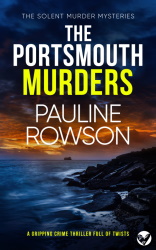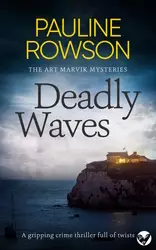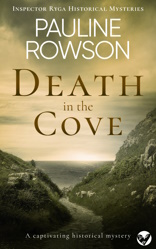
What's in a name? An awful lot as far as an author is concerned. Getting the right name for the characters in my crime novels can be a tricky business. Sometimes they can come to me completely out of the blue, other times I will struggle to find the name that best suits that particular character and until I do the personality refuses to come alive. The name also needs to fit with the age and nationality of that character although you can have exceptions.
When seeking inspiration for first names I have several methods. I turn to my little book of babies names; I look up websites of babies names; I also keep an ear out for any unusual or interesting names when meeting people and will jot these down, and I scour graveyards for both interesting first names and surnames.
One danger can be over-using a certain name, both first names and surnames for different characters in different novels. It is difficult to keep track of the names of all my characters names, especially as I have written several books (27). I started off keeping a database but that didn't work, then I kept lists and that soon became defunct. I rely on my memory, which is not very reliable so there could very well be duplicates. I conduct a search of my past novels and do a 'find' on the computer programme to double check, even then I can miss them. When it comes to first names for some reason I seem to have a penchant for the name Eric, and when I did a search through previous novels found that I’d used it before for different characters, albeit minor ones. So no more Erics.
As to surnames, aside from walking around graveyards, I let my finger do the choosing and tend to pick these out of an atlas or street map. Then I see if it fits with the first name and the character.
Readers tell me that some novelists have too many characters’ surnames all beginning with the same letter and they find this very confusing. Now I scrutinise my work to check that not everyone has a surname beginning with the letter ‘C’. Not sure why I gravitate towards ‘C’ but I do.
Some readers also report that if the name is too difficult to pronounce then they have difficulty getting to grips with the character and therefore engaging in and enjoying the novel. And too many difficult to pronounce names in one novel can completely put them off. That's the last thing an author needs. But I guess it depends on what type of novel you are writing, and its setting.
 I've no idea where the name for my enigmatic Detective Inspector Andy Horton - who currently appears in sixteen crime novels soon to be seventeen (November 2023) - sprang from. It just seemed to pop into my head. I have since learned that there is indeed an Insepctor of the same name in the Hamphire and Isle of Wight Constabularly and have spoken with him. He doesn't at all mind me pinching his name, so I'm safe from being locked up in cell. And, sigh of relief, his Horton is spelt differently. (Phew, wipes her brow).
I've no idea where the name for my enigmatic Detective Inspector Andy Horton - who currently appears in sixteen crime novels soon to be seventeen (November 2023) - sprang from. It just seemed to pop into my head. I have since learned that there is indeed an Insepctor of the same name in the Hamphire and Isle of Wight Constabularly and have spoken with him. He doesn't at all mind me pinching his name, so I'm safe from being locked up in cell. And, sigh of relief, his Horton is spelt differently. (Phew, wipes her brow).
 Art Marvik, who appears in four mystery thrillers is an edgy character, an action man and former Royal Marine Commando, Special Boat Services Officer. He therefore (to me) had to have an action name. I chose Art. I sort of pinched it from Bruce Willis in Mercury Rising! I played around with various combinations of his surname until I got something that sounded slightly foreign (he's half Finnish), modern, edgy, fearless, just and tough, as is the character.
Art Marvik, who appears in four mystery thrillers is an edgy character, an action man and former Royal Marine Commando, Special Boat Services Officer. He therefore (to me) had to have an action name. I chose Art. I sort of pinched it from Bruce Willis in Mercury Rising! I played around with various combinations of his surname until I got something that sounded slightly foreign (he's half Finnish), modern, edgy, fearless, just and tough, as is the character.
 Inspector Ryga (1950s set mysteries) started off as Inspector Rees as he has a welsh background but had left Wales when he was 15 to join the merchant navy like his father. Ryga is actually Latvia’s capital on the Baltic Sea but that had no influence on me choosing the name. It wasn’t until I had got well into Eva Paisley’s character – she is the war photographer who Ryga teams up with to solve crimes – that from her lips ‘Rees’ didn’t sound right. She is forthright and confident and rarely calls him by his first name. I tried Regan but that kept making me think of the TV programme The Sweeney with Regan in it (John Thaw) and my character was the opposite to his so I played around with it, dropped the ‘n’ got Rega then changed the ‘e’ to ‘y’ and got Ryga (sounds like ‘Tiger’) and that sounded good coming from Eva - sharp, edgy. I liked it and it stuck.
Inspector Ryga (1950s set mysteries) started off as Inspector Rees as he has a welsh background but had left Wales when he was 15 to join the merchant navy like his father. Ryga is actually Latvia’s capital on the Baltic Sea but that had no influence on me choosing the name. It wasn’t until I had got well into Eva Paisley’s character – she is the war photographer who Ryga teams up with to solve crimes – that from her lips ‘Rees’ didn’t sound right. She is forthright and confident and rarely calls him by his first name. I tried Regan but that kept making me think of the TV programme The Sweeney with Regan in it (John Thaw) and my character was the opposite to his so I played around with it, dropped the ‘n’ got Rega then changed the ‘e’ to ‘y’ and got Ryga (sounds like ‘Tiger’) and that sounded good coming from Eva - sharp, edgy. I liked it and it stuck.
It can take me quite a while to come up with the right name but it's time well spent.
The name has to fit. If it's not right then the character isn't right and that means the writing doesn't flow because it is the character's actions, mannerisms, reactions and personality that drives the plot.
Pauline Rowson lives on the South Coast of England and is the best selling author of many crime novels, published by Joffe Books. Her popular crime novels include the DI Andy Horton Solent Murder Mystery series, the Art Marvik mystery thrillers and the 1950s set Inspector Ryga mysteries. Subscribe to her newsletter for all the latest books news.